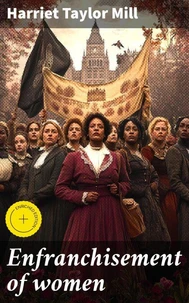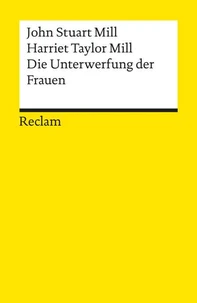Enfranchisement of women
Par :Formats :
Disponible dans votre compte client Decitre ou Furet du Nord dès validation de votre commande. Le format ePub est :
- Compatible avec une lecture sur My Vivlio (smartphone, tablette, ordinateur)
- Compatible avec une lecture sur liseuses Vivlio
- Pour les liseuses autres que Vivlio, vous devez utiliser le logiciel Adobe Digital Edition. Non compatible avec la lecture sur les liseuses Kindle, Remarkable et Sony
 , qui est-ce ?
, qui est-ce ?Notre partenaire de plateforme de lecture numérique où vous retrouverez l'ensemble de vos ebooks gratuitement
Pour en savoir plus sur nos ebooks, consultez notre aide en ligne ici
- Nombre de pages28
- FormatePub
- ISBN859-65--4702290-9
- EAN8596547022909
- Date de parution29/05/2022
- Protection num.Digital Watermarking
- Taille285 Ko
- Infos supplémentairesepub
- ÉditeurDIGICAT
Résumé
In "Enfranchisement of Women, " Harriet Taylor Mill boldly articulates the moral and intellectual imperatives of women's rights, arguing for their right to vote and participate fully in society. Written in the mid-nineteenth century, this work employs a compelling blend of philosophical argumentation and social critique, situated within the broader context of utilitarianism and the burgeoning feminist movement.
Taylor Mill employs a clear, persuasive prose style that challenges contemporary societal norms, advocating for gender equality as an essential element of human progress and societal improvement. Harriet Taylor Mill, a prominent philosopher and suffragist, was profoundly influenced by her partnership with John Stuart Mill, whose ideas on liberty and equality permeate her work. Her own experiences as a woman in a patriarchal society fueled her dedication to advocating for women's rights.
Tragically, Taylor Mill faced considerable societal pushback for her progressive views, yet she remained steadfast in her belief that enfranchisement was pivotal for both individual and collective advancement. "Enfranchisement of Women" is essential reading for contemporary audiences, providing profound insights into the historical struggle for women's rights that resonate today. Taylor Mill's eloquent arguments and moral clarity challenge readers to reflect on the ongoing fight for equality, making this text not only a historical document but also a timeless call to action.
Engaging with this work enriches our understanding of gender justice and inspires modern advocacy.
Taylor Mill employs a clear, persuasive prose style that challenges contemporary societal norms, advocating for gender equality as an essential element of human progress and societal improvement. Harriet Taylor Mill, a prominent philosopher and suffragist, was profoundly influenced by her partnership with John Stuart Mill, whose ideas on liberty and equality permeate her work. Her own experiences as a woman in a patriarchal society fueled her dedication to advocating for women's rights.
Tragically, Taylor Mill faced considerable societal pushback for her progressive views, yet she remained steadfast in her belief that enfranchisement was pivotal for both individual and collective advancement. "Enfranchisement of Women" is essential reading for contemporary audiences, providing profound insights into the historical struggle for women's rights that resonate today. Taylor Mill's eloquent arguments and moral clarity challenge readers to reflect on the ongoing fight for equality, making this text not only a historical document but also a timeless call to action.
Engaging with this work enriches our understanding of gender justice and inspires modern advocacy.
In "Enfranchisement of Women, " Harriet Taylor Mill boldly articulates the moral and intellectual imperatives of women's rights, arguing for their right to vote and participate fully in society. Written in the mid-nineteenth century, this work employs a compelling blend of philosophical argumentation and social critique, situated within the broader context of utilitarianism and the burgeoning feminist movement.
Taylor Mill employs a clear, persuasive prose style that challenges contemporary societal norms, advocating for gender equality as an essential element of human progress and societal improvement. Harriet Taylor Mill, a prominent philosopher and suffragist, was profoundly influenced by her partnership with John Stuart Mill, whose ideas on liberty and equality permeate her work. Her own experiences as a woman in a patriarchal society fueled her dedication to advocating for women's rights.
Tragically, Taylor Mill faced considerable societal pushback for her progressive views, yet she remained steadfast in her belief that enfranchisement was pivotal for both individual and collective advancement. "Enfranchisement of Women" is essential reading for contemporary audiences, providing profound insights into the historical struggle for women's rights that resonate today. Taylor Mill's eloquent arguments and moral clarity challenge readers to reflect on the ongoing fight for equality, making this text not only a historical document but also a timeless call to action.
Engaging with this work enriches our understanding of gender justice and inspires modern advocacy.
Taylor Mill employs a clear, persuasive prose style that challenges contemporary societal norms, advocating for gender equality as an essential element of human progress and societal improvement. Harriet Taylor Mill, a prominent philosopher and suffragist, was profoundly influenced by her partnership with John Stuart Mill, whose ideas on liberty and equality permeate her work. Her own experiences as a woman in a patriarchal society fueled her dedication to advocating for women's rights.
Tragically, Taylor Mill faced considerable societal pushback for her progressive views, yet she remained steadfast in her belief that enfranchisement was pivotal for both individual and collective advancement. "Enfranchisement of Women" is essential reading for contemporary audiences, providing profound insights into the historical struggle for women's rights that resonate today. Taylor Mill's eloquent arguments and moral clarity challenge readers to reflect on the ongoing fight for equality, making this text not only a historical document but also a timeless call to action.
Engaging with this work enriches our understanding of gender justice and inspires modern advocacy.



